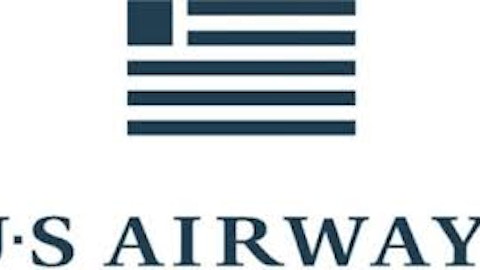However, the strategic importance of New York makes it more likely that American will keep trying to expand its presence at JFK, even though capacity is constrained by the lack of available slots there. While a resurgent American Airlines could crimp Delta’s plans to gain market share in New York, Delta will be improving its own position at the same time, through a recently announced joint venture with Virgin Atlantic. That airline is the second largest carrier at Heathrow (albeit a distant second), and this partnership will vastly expand Delta’s access to that critical market. Benefits from this new joint venture should more than offset any uptick in competition from American.
3. Low-cost carriers
Companies such as Southwest Airlines Co. (NYSE:LUV) and JetBlue Airways Corporation (NASDAQ:JBLU) are likely to see the biggest benefit from the merger. As the three network carriers (American, United, and Delta) focus on gaining high-value international business travelers, Southwest and JetBlue will probably have opportunities to grow domestically. Southwest is best positioned to take advantage of any capacity rationalization that eventually takes place following the merger, because of its larger size and nationwide footprint.
For example, the US Airways hub in Phoenix lies between American’s hubs in Dallas/Fort Worth and Los Angeles. With the latter two being larger and more important business markets, Phoenix could eventually see some service cuts. Phoenix is already the fourth largest focus city in Southwest’s network, with 173 daily departures to 47 cities. If American downsizes there, Southwest would gladly take up the slack.
For JetBlue, the biggest upside comes from the strategic value of its hub at JFK Airport in New York. JetBlue has had an interline agreement with American Airlines since 2010, which allows customers to connect between American and JetBlue at JFK (and also in Boston). If American chooses to grow its European gateway at JFK, slot constraints will force it to rely even more heavily on JetBlue to generate connecting traffic. In other words, as American shifts JFK capacity toward international flights, JetBlue could see a corresponding increase in traffic on its domestic flights at JFK.
Conclusion
Thus, low-cost carriers such as Southwest and JetBlue are likely to be the biggest beneficiaries of the most recent round of airline consolidation. For Delta, and particularly for United, having two weaker competitors combine into one strong one is more likely to hurt than to help.
The article What Does This Airline Merger Mean for Competitors? originally appeared on Fool.com and is written by Adam Levine-Weinberg.
Fool contributor Adam Levine-Weinberg owns shares of Delta Air Lines and is short Mar 2013 $14 Calls on Delta Air Lines. He’s also short shares of United Continental Holdings (NYSE:UAL). The Motley Fool recommends Southwest Airlines.
Copyright © 1995 – 2013 The Motley Fool, LLC. All rights reserved. The Motley Fool has a disclosure policy.




